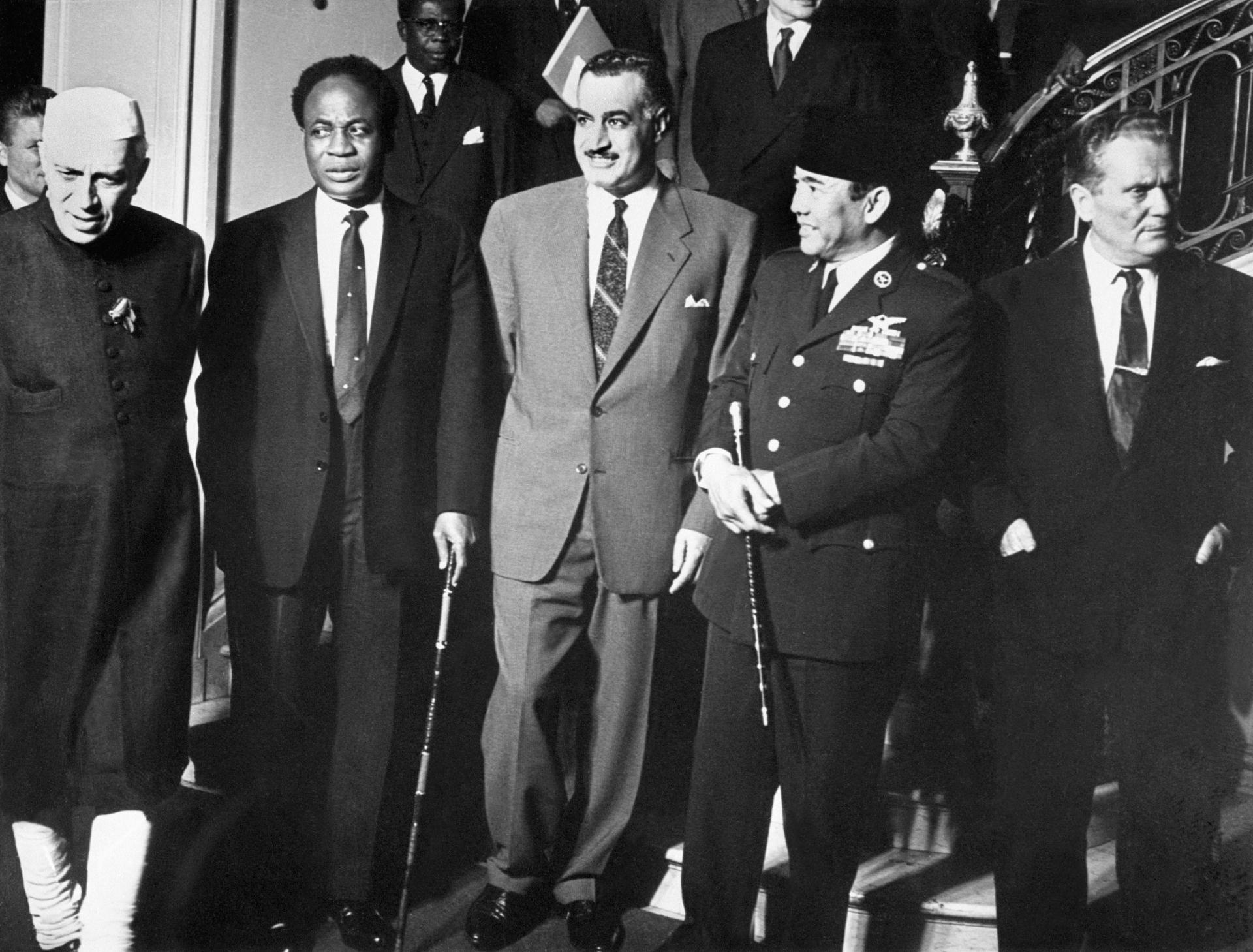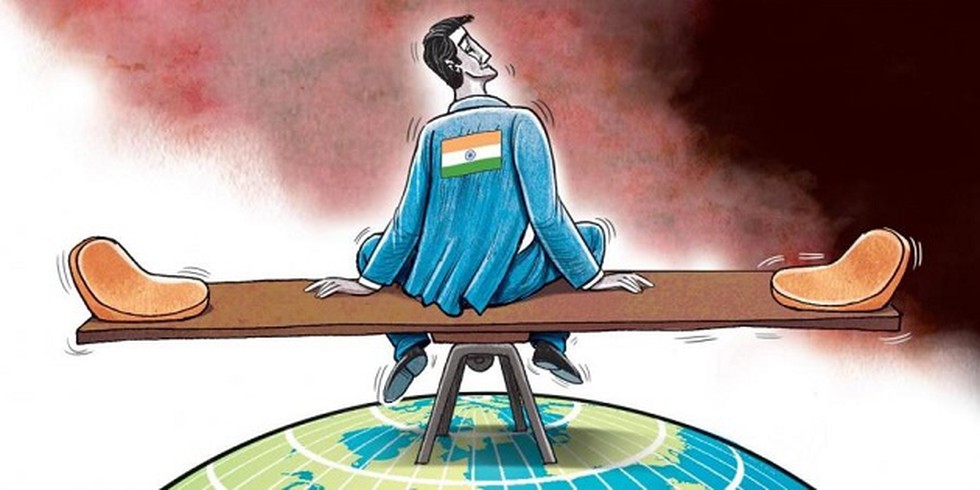Table of contents

The 19th NAM summit just concluded in January 2024 in Kampala, Uganda, under the theme "Deepening Cooperation for Shared Global Affluence." This summit focused on issues like:
- Promoting economic development and trade among NAM members
- Addressing the impact of climate change
- Fighting against inequalities and promoting human rights
- Strengthening cooperation on global health issues
What is NAM?
The Non-Aligned Movement (NAM) is a forum of 120 countries that are not formally aligned with or against any major power bloc. It was founded with the view to advancing the interests of developing countries in the context of Cold War confrontation.

After the United Nations, it is the largest grouping of states worldwide.
It seeks to promote peace, independence, self-determination, and cooperation among its members.
Overview
- Founded: 1961 in Belgrade, Serbia
- Founders: Jawaharlal Nehru (India), Josip Broz Tito (Yugoslavia), Gamal Abdel Nasser (Egypt), Kwame Nkrumah (Ghana), and Sukarno (Indonesia)
- Membership: 120 countries, constituting two-thirds of the UN General Assembly
- Principles:
- Non-alignment with major power blocs
- Respect for territorial integrity and sovereignty
- Non-interference in internal affairs
- Peaceful settlement of disputes
- Promotion of cooperation and development
- Structure: No formal constitution or permanent secretariat, decisions made by consensus at Summit Conferences held every three years
- Current Chair: Azerbaijan (until late 2024)
- Achievements: Played a significant role in decolonization, opposed apartheid, advocated for disarmament and nuclear non-proliferation, promoted South-South cooperation
Although the Cold War ended, the NAM remains relevant as a platform for developing countries to address issues like global inequality, economic development, environmental protection, and human rights.
Origins and History
- 1955 - Bandung Conference
- The seeds of NAM were sown at the Bandung Conference in Indonesia, where 29 Asian and African states met to discuss their common interests and concerns.
- Leaders like Jawaharlal Nehru of India, Gamal Abdel Nasser of Egypt, and Sukarno of Indonesia played key roles in this initial momentum.

- 1961 - Belgrade Summit: Six years later, the first official NAM summit was held in Belgrade, Yugoslavia, with 25 participating countries. This marked the formal establishment of the movement and adopted five principles of peaceful coexistence as its foundation.
- Cold War era: During the Cold War, NAM became a significant force in international politics, advocating for disarmament, the creation of a New International Economic Order, and opposing colonialism and apartheid. Notable leaders like Tito of Yugoslavia, Fidel Castro of Cuba, and Kwame Nkrumah of Ghana were prominent figures in shaping NAM's direction.
- Post-Cold War: With the end of the Cold War, NAM's role and purpose were questioned by some. However, the movement adapted, focusing on issues like global inequality, environmental degradation, and promoting South-South cooperation.
We can't clear UPSC for you.
But with our personalised mentor support, you'll be ready to do it yourself.
Major Landmark Decisions
- Decolonization:
- 1961: Bandung Conference establishes the NAM, with a focus on dismantling colonialism and promoting self-determination.
- 1960s-1970s: NAM actively supports liberation movements across Africa, Asia, and Latin America, contributing to the independence of countries like Algeria, Angola, Mozambique, and Namibia.
- 1970: NAM condemns Portugal's colonial wars in Africa and urges UN action.
- 1975: NAM plays a crucial role in ending the Vietnam War and securing Vietnamese independence.
- Opposition to Apartheid:
- 1962: NAM declares apartheid a crime against humanity and calls for international sanctions against South Africa.
- 1974: NAM launches the Special Committee against Apartheid to coordinate global action.
- 1980s: NAM supports the anti-apartheid movement within South Africa and condemns violence by the regime.
- 1994: NAM welcomes the end of apartheid and the establishment of a democratic South Africa.
- Disarmament and Nuclear Non-Proliferation:
- 1961: NAM calls for a complete ban on nuclear weapons testing.
- 1968: NAM plays a key role in securing the Nuclear Non-Proliferation Treaty (NPT).
- 1980s: NAM advocates for nuclear-weapon-free zones in various regions, including Africa, Latin America, and the South Pacific.
- 2017: NAM adopts the Treaty on the Prohibition of Nuclear Weapons, aimed at eliminating nuclear arsenals globally.
- South-South Cooperation:
- 1964: Creation of the Group of 77 (G-77) within the NAM to promote collective action and bargaining power for developing countries.
- 1975: Establishment of the South Centre as a research and policy think tank for NAM countries.
- 1980s: NAM pushes for a New International Economic Order (NIEO) to address the economic inequalities between developed and developing countries.
- 2000s onwards: NAM continues to advocate for South-South cooperation in areas like trade, technology transfer, and sustainable development.
- Human Rights and Sustainable Development:
- 1960s: NAM condemns racial discrimination and colonialism, promoting human rights principles.
- 1970s: NAM calls for a New International Information Order (NIIO) to address media bias and promote cultural diversity.
- 1980s: NAM actively participates in UN conferences on human rights, environment, and development.
- 2000s onwards: NAM continues to champion human rights and sustainable development goals, advocating for social justice, environmental protection, and poverty eradication.

Challenges and Future Directions
- Internal Unity: Maintaining cohesion among diverse member states with varying interests can be challenging for NAM.
- Relevance in the Contemporary Global Context: The movement needs to reassess its relevance and adapt to address new and emerging global challenges, such as climate change, trade wars, and terrorism.
- Updating Agenda and Priorities: NAM must update its agenda to reflect current global dynamics and prioritize issues that are most pressing for its member states.
- Balancing Advocacy and Collaboration: Balancing its advocacy for multilateralism and national self-determination with the need for selective collaboration and engagement with other centers of power poses a significant challenge.
- Absence of Formal Administrative Structure: The absence of a formal administrative structure and constitution hinders the movement's decision-making processes and overall functioning.
Is NAM still Relevant?
Representation of the Global South:
- Climate Change: NAM has been a vocal advocate for addressing climate change, pushing for developed nations to fulfill their financial commitments and prioritize the needs of developing countries most vulnerable to its impacts. (E.g., NAM's role in securing the Paris Agreement)
- Food Security: NAM member states collaborate on initiatives to improve agricultural practices, promote sustainable food production, and combat hunger and malnutrition within the Global South. (E.g., FAO South-South Cooperation initiatives)
Advocacy for Multilateralism:
- Reform of the UN Security Council: NAM advocates for expanding the UN Security Council to include representation from the Global South, promoting a more balanced and inclusive decision-making process. (E.g., NAM's Ezulwini Consensus)
- International Criminal Court: NAM member states played a crucial role in the establishment of the International Criminal Court, upholding the principles of accountability and justice for human rights violations.
Conflict Resolution and Peacebuilding:
- Colombia Peace Process: NAM member states, like Venezuela and Cuba, played key roles in facilitating dialogue and mediation efforts that led to the historic peace agreement between the Colombian government and FARC rebels.
- South Sudan Conflict: NAM has actively called for peaceful solutions to the conflict in South Sudan, deploying observers and urging international action to address the humanitarian crisis.
Economic Cooperation and Development:
- South-South Development Fund: NAM established the South-South Development Fund to provide financial assistance for development projects in member states, promoting South-South cooperation and knowledge sharing.
- Group of 77: NAM member states collaborate within the Group of 77 (G77) to advocate for fairer trade terms, increased development aid, and debt relief for developing nations.
Human Rights and Social Justice:
- Promotion of Women's Rights: NAM actively advocates for the empowerment of women, promoting gender equality in politics, economy and society. (E.g., using quotas to increase the number of women in the parliaments of NAM member states.)
- Right to Development: NAM member states advocate for the recognition of the Right to Development as a fundamental human right, emphasizing the importance of economic and social development for human dignity.
NAM's activities touch upon a wide range of issues in today's complex world order. While navigating internal challenges and adapting to a changing geopolitical landscape, NAM remains a significant force in global politics, shaping international norms and advocating for the interests of the Global South.
Previous Post